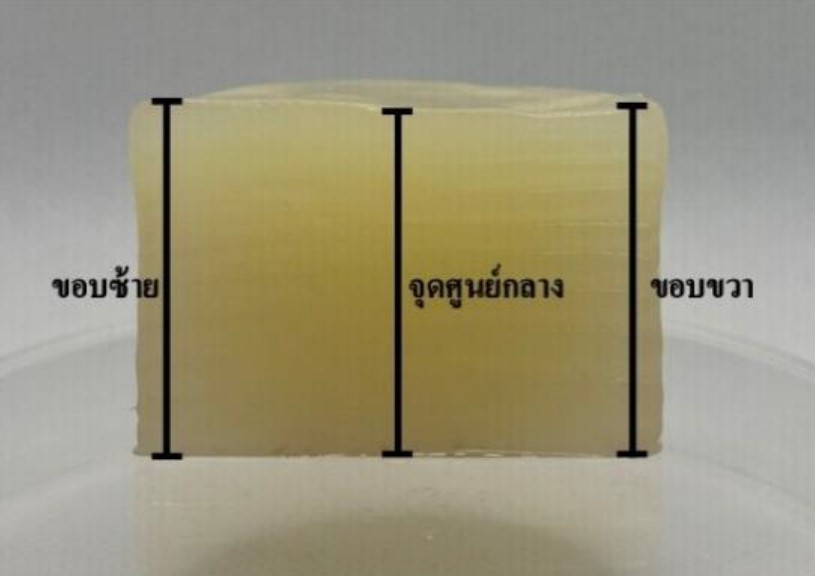Influence of Fruit Juices and Optimum of Ammonium Sulfate on the Bacterial Cellulose Production
Keywords:
bacterial cellulose, Acetobacter xylinum, coconut water, pineapple juice, ammonium sulfateAbstract
Bacterial cellulose is a product obtained from the synthesis of cellulose outside the cell, produced by bacteria. The purpose of this research is to study the influence of fruit juices and the optimum of ammonium sulfate on bacterial cellulose production from Acetobacter xylinum. The experiments were conducted by a 2 × 3 factorial experiment using a completely randomized design with five replications. There were two types of fruit juice, including coconut water and pineapple juice. Three levels of ammonium sulfate were used at 0.25%, 0.50% and 0.75%. Wet weight and thickness of bacterial cellulose sheet were collected. The results showed that there was a significant difference (p < 0.05) between the main effects of fruit juices and the amount of ammonium sulfate on the wet weight and thickness of bacterial cellulose. However, there was no interaction effect between them. The treatments that gave the highest average of wet weight and thickness were coconut water (wet weight 37.671.94 g., thickness 2.740.18 cm.) and the concentration levels 0.25% or 0.50% of ammonium sulfate (wet weight 29.689.46 and 30.009.08 g. respectively, thickness 2.150.73 and 2.180.71 cm. respectively)
References
Bielecki, S., Krystynowicz, A., Turkiewicz, M. & Kalinowska H. (2005). Bacterial cellulose. Polysaccharides and polyamides in the food industry: properties, production, and patents. pp. 31-84. Wiley-VCH Verlag GMBH & Co. KgaaPublisher.
Boonpan, A., Pongswat, S. & Khampha, C. (2013). A study on the optimum condition for nata production from molasses. In the 48th Kasetsart University Annual Conference,3-5 March, 2010, (pp. 547-554). Bangkok:Faculty of Agricultural, Kasetsart University.
Brown, A. J. (1886). An acetic ferment which forms cellulose. Scientific American suplement, 21(545),8701-8702.
Chawla, P.R., Bajaj, I.B., Survase, S.A.,& Singhal, R.S. (2009). Microbial cellulose: fermentative production and applications. Food Technology Biotechnology, 47(2),107-124.
Çoban, E. P., & Biyik, H. (2011). Effect of various carbon and nitrogen sources on cellulose synthesis by Acetobacter lovaniensis HBB5. African Journal of Biotechnology,10(27), 5346-5354.
Dejsungkranont, M. (2018). A study on the optimum condition for bacterial cellulose production from red dragon fruit (Hylocereus polyrhizus(Weber) Britton & Rose) using response surface methodology. Khon Kaen Agriculture Journal, 46(2),213-226.
Jagannath, A., Kalaiselvan, A., Manjunatha, S.S., Raju, P.S. & Bawa, A.S. (2008). The effect of pH, sucrose and ammonium sulphate concentrations on the production of bacterial cellulose (Nata-de-coco) by Acetobacter xylinum. World Journal of Microbiology & Biotechnology, 24(11),2593-2599.
Li, L., Liu, S. & Li, C. (2013). Effect of coconut water on the growth of Gluconacetobacter xylinus Y15. Advanced Materials Research, 9(781-784),1736-1740.
Margaretty, E., Dewi, E., Kalsum, L., Ningsih, A.S. & Amin J.M. (2020). Effect of sugar, ammonium sulfate and magnesium sulfate as supplementary nutrients in coconut water fermented by Acetobacter xylinum to produce biocellulose membranes. Atlantis Highlights in Engineering, 4(7),89-94.
Mühlethaler, K. (1949). The structure of bacterial cellulose. Biochimica et Biophysica Acta, 3(1),527-535.
Office of Agricultural Economics. (2021). Export statistics of fresh or frozen pineapple from 2011 to 2021. Retrieved October15, 2021,fromhttp://impexp.oae.go.th/service/export.php?S_YEAR=2554&E_YEAR=2564&PRODUCT_GROUP=5252&PRODUCT_ID=5001&wf_search=&WF_SEARCH=Y#export.
Riansut, W. (2016). Experimental Designs.Songkhla:Thaksin University Book Center.
Rojsuntornkitti, K., Jittrepotch, N., Kongbangkerd, T., Phanumong, P., Thongchuang, M. & Kraboun K. (2020). Effect of (NH4)2SO4on some qualities of Nata de pina produced by Acetobacter xylinum. Food and Environment Safety Journal, 19(1),92-97.
Shoda, M. & Sugano, Y. (2005). Recent advances in bacterial cellulose production. Biotechnology and Bioprocess Engineering, 10(1), 1-8.
Siripanporn, J., Tammarate, P., Stonsaovapak, S., Saiyudthong, S., Vachanavinich, K., Maleehuan, S., Tammarate, S. & Dinh-Ngoc-Loan (2001). Factors effecting on bacterial cellulose production from coconut milk. Food Journal (Thailand), 31(3),166-173.
Sutanto, A. (2012). Pineapple liquid waste as Nata de pina raw material. MAKARA Journal of Technology, 16(1),63-67.
Sutherland,I.W. (1998). Novel and established applications of microbial polysaccharides. Trends in Biotechnology, 16(1),41–46.
Ul-Islam, M., Khan, T. & Park, J.K. (2012). Water holding and release properties of bacterial cellulose obtained by in situ and ex situmodification. Carbohydrate Polymers, 88(2),596–603.

Downloads
Published
License
Copyright (c) 2024 Journal of Applied Science and Emerging Technology

This work is licensed under a Creative Commons Attribution-NonCommercial-NoDerivatives 4.0 International License.

